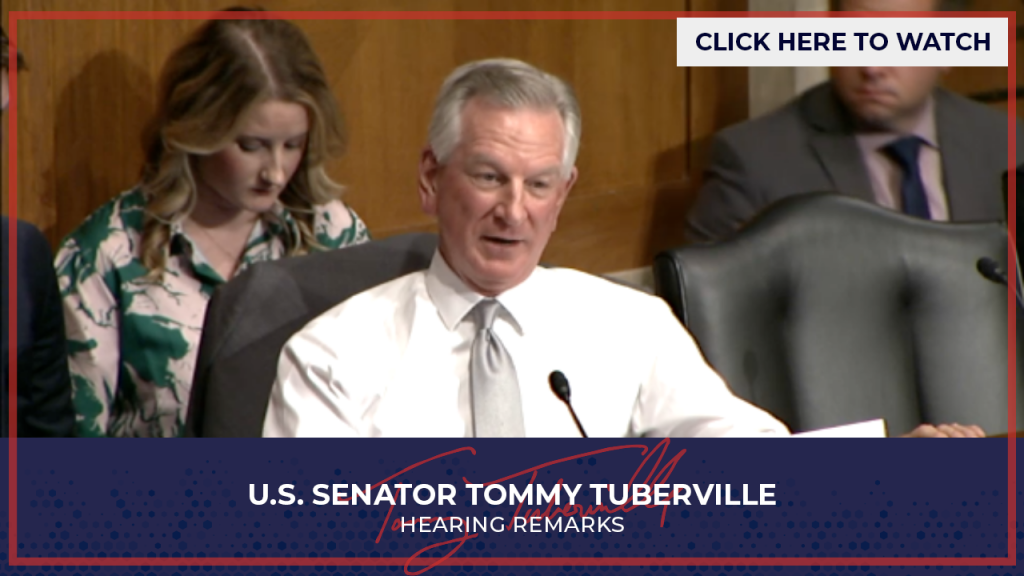WASHINGTON – Today, Senator Tommy Tuberville (R-AL) questioned union leaders during a Senate Committee on Health, Education, Labor, and Pensions (HELP) hearing. Coach Tuberville specifically asked about the impacts of worker strikes on inflation, the truck driver shortage, the push for electric vehicles, and airline recruitment problems.
Read excerpts from Coach Tuberville’s remarks below or watch here.

Sen. Tuberville: “Thank you for being here today. Mr. Higgins, our economy is in an incredibly shaky position. Inflation is off the charts, especially after COVID. With all the strikes over the last few years, has that played an impact on our economy?” […]
Mr. Higgins: “I don’t know that they’ve had much of an impact as of yet, but certainly the increases in pay is going to create the problem of potential wage price spiral and that will increase inflation itself.”
Sen. Tuberville: “Mr. O’Brien, we had a hearing not too long ago about how we’re going to be probably over a million truck drivers short in the next five, six, seven years. What’s the teamsters doing in terms of recruiting and planning for this in terms of recruiting and training?”
Mr. O’Brien: “Well, I think, first and foremost, what I testified to earlier is very helpful as a result of us settling a record UPS agreement. I think at the previous hearing, there was some numbers put out there where UPS drivers only made fifty-nine thousand dollars per year. That’s not true – on their own website they make one-hundred and sixty-two thousand per year. So, by us raising industry standards, that will help in the recruitment. We also have a very robust military training program where people come back from the military and we train them and place them in companies like ABF, United Parcel Service, TForce and many other partners that we have as employers. And I just want to be clear – not every relationship that we have with employers is adversarial. We work day and night to make sure that we create opportunities so that these companies can be successful. To some companies that obviously can’t and we bear the brunt of that, but we do work with our partners to make sure that we fulfill the needs of this country and keep supply chain[s] moving.”
Sen. Tuberville: “Mr. Fain, the Biden Administration’s prioritizing climate change. We all know that. We’ve seen it. We felt the repercussions from it going to electric vehicles. In 2027 and beyond, two-thirds of the new vehicles on the road are supposed to be EVs. Going through all those – EPA regulations are out of sight. So, what’s your thoughts on the availability of the union jobs and the pushed EVs and the automatic EV industry?”
Mr. Fain: “Thank you. Look, we believe in a green economy. We always have been. The UAW has always led the way when it comes to environmental issues.”
Sen. Tuberville: “Does it cut back on jobs? I keep hearing that.”
Mr. Fain: “So, it doesn’t have to. Through this contract, we didn’t just only bargain for battery work. I think what gets lost in this is there’s battery trade work, there’s electric drive motor work, there’s e-motors, and housing and covers. We negotiated for all those things. But the other thing we also did was we negotiated to bring combustible engine work back to some of our plants from Mexico and other areas and so we have to see the direction it goes, but you know, we’re going embrace this. We’re not going to run from it, but our biggest concern through all this is it needs to be a just transition in this process where workers aren’t left behind.” […]
Sen. Tuberville: “Ms. Nelson, we all fly quite a bit. What is the biggest complaint from flight attendants? And don’t give me money. I’m not talking about money. What is the biggest complaint now to where we can get more qualified, consistent, you know, flight attendants on flights.”
Ms. Nelson: “What’s very difficult is that today it is extremely combative in the cabin, and we have fewer staff than we ever have. So, there’s fewer flight attendants per passenger.”
Sen. Tuberville: “That’s not going to get any better. We’ve got to have people to break up these fights, you know, obviously.”
Ms. Nelson: “Yes, absolutely. And leadership to encourage people to come together and understand that we can actually safely get from one place to another without having a brawl is very helpful. So, appreciate leaders around the country talking about unity and talking about how we’re better off when we work together to ensure that safety and security come first. And that people can come to work without being fearful of being a punching bag.”
Sen. Tuberville: “Yeah. I think we ought to agree too – we got to get more people back to work training. I came from the education field, [we need to get] more kids into technical training [rather] than going to a four-year school that you’re not going to get anything out of.”
Senator Tommy Tuberville represents Alabama in the United States Senate and is a member of the Senate Armed Services, Agriculture, Veterans’ Affairs, and HELP Committees.
###